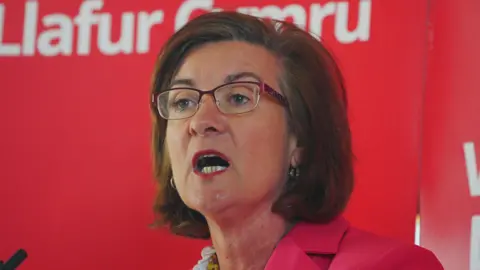In a recent press release, First Minister of Wales, Eluned Morgan, eloquently expressed the mounting pressures she faces as she prepares for her party’s challenges ahead of the next Senedd election. Following a year of her leadership, polls indicate that Labour may be at risk of losing its governmental dominance for the first time since the 1920s. This evolving political landscape has compelled Morgan to confront her “historic responsibility” as leader, particularly amidst the complexities of her party’s current standing.
A significant aspect of Morgan’s tenure has been her acknowledgment of the ongoing critiques from opposition parties. They have accused her administration of “drift,” “dithering,” and a failure to effectively address longstanding issues within Wales. Such criticisms highlight a perception that challenges, particularly in sectors like healthcare and education, are not being resolved to the satisfaction of the electorate. With these assessments in mind, Morgan remains aware that her role extends beyond governance; it is about revitalizing Labour’s image in a state of flux.
Morgan took over leadership during a tumultuous phase for Welsh Labour, succeeding Vaughan Gething, whose time in office ended amid a scandal involving a substantial donation from an individual with a controversial past. Rather than engage in a competitive selection process, Morgan ascended to the position unopposed, leading her to focus on a narrow spectrum of policy priorities, chiefly aimed at reducing lengthy NHS wait times. Despite pointing to improvements in certain statistics, she admitted to the frustrations that accompany persistent challenges, particularly in the service provision of the Betsi Cadwaladr health board.
In a recent podcast appearance, Morgan openly conveyed her exasperation with the current health system, stating, “I am pulling my hair out,” underscoring her desire for efficient solutions. She indicated progress by mentioning the diversification of treatment options to independent sectors, aiming to mitigate waiting times that had recently surged. Statistics indicate that the number of individuals waiting over two years has increased, thus reinforcing the need for sustained vigilance in health service delivery.
As Morgan reflects on her first year, she regards her position as First Minister with a grave sense of duty. The upcoming Senedd election presents both an opportunity and a threat, compelling her to galvanize public support for Labour’s achievements and reaffirm the value of public services such as free prescriptions and school meals. “I think we’ve got to remind people of what’s at stake,” she declared, emphasizing the inherency of pressure associated with her role as the inaugural female leader of Wales.
A defining moment in Morgan’s tenure occurred in May when she made headlines with her “Red Welsh Way” speech. Here, she vocally challenged the current UK governmental policies, appealing for deeper attention and support from Westminster. Morgan made clear that while gains have been made—such as increased funding for essential infrastructure—the underlying sentiment remains that these efforts are insufficient, and she will continue to advocate for more resources.
The criticisms leveled by opposition factions have not gone unnoticed. For example, Welsh Conservative leader Darren Millar remarked on the stagnation witnessed during Morgan’s initial year, arguing that the same issues continue to plague Wales, particularly in transportation policies and public expenditure. Meanwhile, Plaid Cymru’s Heledd Fychan echoed these sentiments, labeling Morgan’s administration as marked by ineffectiveness across various sectors.
In this political milieu, Morgan finds her leadership challenged not only by external critique but also by internal party dynamics that she describes as “political nonsense.” Her resolve to refocus Labour’s energies on voters’ priorities, rather than internal discord, appears reflective of her commitment to the people of Wales. Morgan has expressed a desire to transcend the factional struggles that have historically impeded progress within her party, emphasizing the importance of unity and effective governance.
In closing, Eluned Morgan’s first year as First Minister encapsulates the complexities of leading Wales during a pivotal political juncture. With the impending elections on the horizon, her ability to navigate these pressures will be critical for the Labour Party’s prospects and her legacy as a transformative leader within the Welsh political landscape.











